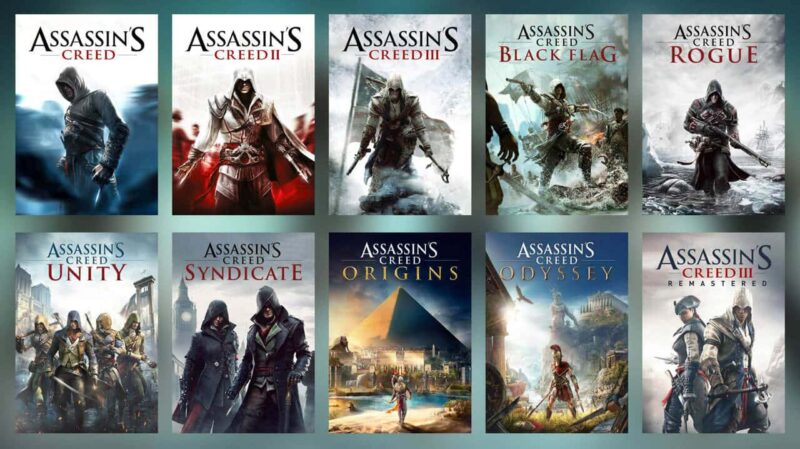Assassin’s Creed, a renowned video game franchise by Ubisoft, has captivated gamers with its enthralling blend of action, open-world exploration, and historical narratives since its first installment in 2007. Players delve into the ongoing battle between the Assassins, who strive for peace through freedom, and the Templar Order, who aim to establish peace through control. Through the use of the Animus, a unique device in the game, players access the memories of various historical characters and influence the course of events spanning ancient to modern times.
Over the years, the franchise has expanded significantly, boasting numerous mainline titles, spin-offs, and novel interpretations. Players seeking to enjoy the full Assassin’s Creed experience may wish to follow the games in their chronological order, immersing themselves in the intricate saga and engaging with diverse time periods, locations, and notable figures from history.
Key Takeaways
- Ubisoft’s Assassin’s Creed delivers a captivating combination of history, open-world exploration, and action.
- Through the Animus, players experience memories of historical characters and explore various time periods.
- Playing the games in chronological order offers a richer, more comprehensive experience of the Assassin’s Creed universe.
Assassin’s Creed – 2007
The first Assassin’s Creed game, released in 2007, introduced players to the medieval Middle East, a period marked by the Third Crusade. The central character, Altair, an assassin, embarks on missions across the Holy Land. The game also features the modern-day protagonist, Desmond Miles, who experiences Altair’s memories through a device called the Animus.
Although the game captured attention with its unique setting and storyline, some players criticized its repetitive gameplay. Nevertheless, the game’s success laid the foundation for the following entries in the series, and the developers took feedback into account to refine the gaming experience in subsequent titles.
Assassin’s Creed II – 2009
Assassin’s Creed II, released in 2009 after a two-year gap from the original, transported players from the Middle East’s medieval period to Renaissance Italy. Building on the first game’s success, this sequel introduced a well-received protagonist, Ezio Auditore da Firenze, and significantly improved game mechanics and diversity.
In this captivating installment, players explore Italy during the Renaissance as Ezio, a likeable and memorable character. The setting’s shift provides a fresh experience, drawing fans even deeper into the immersive world of the Assassin’s Creed series.
Assassin’s Creed: Brotherhood – 2010
In 2010, the much-awaited sequel, Assassin’s Creed: Brotherhood, was released, picking up right where its predecessor, Assassin’s Creed II, left off. This installment introduced several refinements and enhancements to the already successful formula.
One significant improvement was the ability for players to recruit in-game characters as assassins for assistance in battles or to send on various missions, bringing back rewards. This element played a crucial role in the game’s narrative as the protagonist, Ezio, sought to avenge his uncle’s death and retrieve the stolen Apple from Cesare.
Furthermore, Assassin’s Creed: Brotherhood offered more polished combat mechanics and, for the first time in the series, a thrilling competitive multiplayer mode. The combination of these innovative features and the continuation of Ezio’s gripping story made this sequel an exciting addition to the Assassin’s Creed franchise.
Assassin’s Creed: Revelations – 2011
Assassin’s Creed: Revelations delivers the final chapter of Ezio’s journey, transporting players to the heart of the Ottoman Empire in Constantinople. While the core gameplay mechanics remain largely unchanged, the captivating story reveals Ezio’s quest to uncover an ancient artifact sealed away by Altair, which could potentially eliminate the Templars once and for all.
Meanwhile, Desmond, trapped within the Animus 2.0, seeks a crucial memory that links him to both Altair and Ezio. This key memory not only promises to awaken him from his coma but also serves as an important connection between the two Assassins.
One noteworthy addition to Revelations is the Hookblade, a handy tool that enables characters to utilize zip lines, aiding in efficient navigation throughout the city and offering more opportunities for stealthy assassinations.
Although Revelations may not deliver the same adrenaline rush as its predecessors, it remains a captivating experience for players who value engaging narratives. The game skillfully weaves together the stories of Ezio, Altair, and Desmond, successfully immersing players in the Assassin’s Creed series’ rich and immersive world.
Exploring Constantinople, solving ancient mysteries, and utilizing innovate gameplay mechanics like the Hookblade make Assassin’s Creed: Revelations a worthy entry in the franchise’s storied history.
Assassin’s Creed III – 2012
As the Assassin’s Creed series continued evolving, the fifth game, Assassin’s Creed III, introduced players to a new setting and time period – the 18th century during the American Revolution. The protagonist, Ratonhnhaké, adopts an alias, Connor, to seamlessly blend in with fellow Americans.
Connor’s father, Haytham Kenway, is revealed as the Grand Master of the Templar Order in the colonies, creating an intriguing and complex dynamic in the narrative. Apart from the engaging storyline, the game incorporates additional features to enhance player experience. These include:
- Weather changes for more immersive environments
- A variety of new weapons
- Naval exploration for extended adventures
- Animal hunting to challenge players’ skills
These elements contribute to the excitement and entertainment, ensuring Assassin’s Creed III remains a standout entry in the series.
Assassin’s Creed IV: Black Flag – 2013
Assassin’s Creed IV: Black Flag takes place in the Colonial Era, but the events depicted in this game happen before those in Assassin’s Creed III. The central character in this installment is Edward Kenway, the protagonist’s ancestor from the previous game.
Black Flag emphasizes naval exploration and has a strong pirate theme, which is quite evident in its open-world approach. Players can upgrade their ships, build their own Assassin’s Guild, and experience enhanced naval combat. While there aren’t any groundbreaking additions to the series, the refinements in Black Flag represent a noticeable change in the franchise’s direction.
Set during the Golden Age of Piracy, Edward Kenway’s journey leads him to discover the mysterious Observatory. Additionally, players can extend their adventures with downloadable content (DLC), further enriching the experience of the Assassin’s Creed IV: Black Flag world.
Assassin’s Creed: Rogue – 2014
Assassin’s Creed: Rogue was released following Assassin’s Creed Freedom Cry, which was initially a DLC before becoming a standalone game. Rogue marked the end of the Colonial era in the Assassin’s Creed series and introduced a new perspective to the gameplay, allowing players to assume the role of a Templar, rather than an assassin.
The protagonist in Rogue is Shay Patrick Cormac, a Templar who brings a fresh twist to the series. This shift in perspective required additional adjustments to the game mechanics to accommodate the unique Templar role.
Continuing elements from previous games, Assassin’s Creed: Rogue also features naval exploration, with an arctic setting differentiating it from earlier entries in the series.
Watch the trailer here for a glimpse into this captivating addition to the Assassin’s Creed franchise.
Assassin’s Creed: Unity – 2014
In Assassin’s Creed: Unity, players assume the role of Arno Dorian, an assassin navigating through Paris amidst the French Revolution. The game’s plot carries a distinct murder mystery feel, further enhanced by the introduction of more devastating weapons and features.
Notable improvements in Unity include advanced character customization, allowing players to adapt their playstyle better than in previous installments. The game also offers a new cooperative multiplayer mode, providing enhanced gameplay experiences. Despite having more weapon choices, the core game remains generally unchanged.
Unity performs exceptionally well on powerful gaming laptops, ensuring a smooth and immersive gaming experience for players in navigating the detailed European cityscapes. To get a glimpse of the game, you can find the trailer online.
Assassin’s Creed: Syndicate – 2015
Assassin’s Creed: Syndicate takes players to Victorian-era London, a significant departure from previous games in the series. One notable change is the introduction of multiple protagonists, with players controlling the Frye twins, Jacob and Evie, throughout the game.
The primary goal in Syndicate is to obtain the Piece of Eden located in London, a challenging task as the city is under the control of the Templar Grand Master. Players will encounter numerous obstacles and missions along the way, providing various distractions from the central storyline.
As expected, the game boasts an expanded arsenal compared to previous titles. However, the developers decided to remove the multiplayer functionality from this edition. Syndicate can be considered the last game in the series with the “classic” Assassin’s Creed feel, as subsequent games underwent significant changes to adapt to the evolving gaming landscape.
To get a glimpse of the game, check out the trailer.
Assassin’s Creed: Origins 2017
Assassin’s Creed: Origins revitalized the long-standing franchise by introducing major changes to the gameplay, keeping fans engaged. Set in Ancient Egypt during the Ptolemaic period, the game features new combat gear and RPG elements, offering a fresh perspective to the series.
Players take on the role of Bayek of Siwa, a skilled warrior, while encountering historical figures like Cleopatra. Origins also introduces Layla Hassan, a modern day character who explores Bayek’s memories.
Significant improvements in the combat system include the addition of hitboxes, allowing players to target and damage multiple enemies in a single attack. However, this also means opponents can overwhelm the player more easily.
Overall, Assassin’s Creed: Origins provides an enhanced combat experience and a refreshing take on the franchise with its captivating setting and engaging storyline.
Assassin’s Creed: Odyssey – 2018
Assassin’s Creed: Odyssey, released in 2018, is set centuries before the events of Origins, focusing on the conflict-ridden period of the Peloponnesian War in Ancient Greece. Players have the freedom to choose their side in the war and play as either Alexios or Kassandra, mercenaries who are descendants of the legendary King Leonidas.
Much like its predecessor, Odyssey incorporates numerous RPG elements, offering an extensive range of weapons and a vast, immersive world to explore. As a highlight, the game brings back the popular naval combat feature from Assassin’s Creed: Black Flag.
In addition, mythology plays a significant role in the storyline, further enriching the experience for the players in the vibrant world of Assassin’s Creed: Odyssey.
Assassin’s Creed: Valhalla – 2020
Assassin’s Creed: Valhalla, launched in 2020, stands as the 12th primary entry in the renowned series, immersing players in the Viking Invasion of Britain between 872 and 878 AD.
Many gameplay mechanics in Valhalla bear resemblance to those in Origins and Odyssey. However, Valhalla places greater emphasis on stealth for both navigation and combat. The game also shifts its focus from the conventional leveling system to a more personalized approach, allowing players to choose skills from skill trees as they progress through the game.
Curious gamers can explore Valhalla’s world by watching the official trailer before embarking on their journey as Eivor, the protagonist in this thrilling adventure.
Assassin’s Creed: Mirage – 2023
Wrapping Up
Assassin’s Creed: Mirage represents the newest addition to the much-loved franchise, marking its thirteenth main instalment. Set within the bustling environment of 9th century Baghdad, players become immersed in the origin story of Basim from Valhalla, guiding him on his journey from street thief to Master Assassin while grappling with his complex fate.
Ubisoft chose a back-to-basics approach for Mirage, providing a more compact world in comparison to the vast open landscapes of Odyssey and Valhalla. By placing a greater emphasis on elements such as stealth, parkour, and immersive assassinations, Mirage harkens back to the earlier titles in the series. The smaller scale contributes to a linear storyline, allowing gamers to complete the game in under 20 hours – perfect for those with a busy schedule.
As a bonus, fans of the series can also enjoy various spin-off titles like Assassin’s Creed: Altair’s Chronicles, which bring subtle changes and improvements to the gaming experience.
Frequently Asked Questions
What is the most recent Assassin’s Creed title?
The latest release in the Assassin’s Creed series is Assassin’s Creed Valhalla, based in the Viking era.
Which Assassin’s Creed games can I play on PS4?
Here is the sequence of Assassin’s Creed games on PS4:
- Assassin’s Creed IV: Black Flag
- Assassin’s Creed Unity
- Assassin’s Creed Syndicate
- Assassin’s Creed Origins
- Assassin’s Creed Odyssey
- Assassin’s Creed Valhalla
What is the chronological order of Assassin’s Creed games on PC?
Chronological order of the Assassin’s Creed PC games:
- Assassin’s Creed
- Assassin’s Creed II
- Assassin’s Creed: Brotherhood
- Assassin’s Creed: Revelations
- Assassin’s Creed III
- Assassin’s Creed IV: Black Flag
- Assassin’s Creed: Rogue
- Assassin’s Creed: Unity
- Assassin’s Creed: Syndicate
- Assassin’s Creed: Origins
- Assassin’s Creed: Odyssey
- Assassin’s Creed: Valhalla
How are the different Assassin’s Creed games ranked?
There’s no definitive ranking for the Assassin’s Creed games, as opinions vary. However, titles like Assassin’s Creed II and Assassin’s Creed: Origins are often regarded as fan favorites by the gaming community.
How many games are in the Assassin’s Creed series?
There are currently 13 main Assassin’s Creed games and 17 additional spinoff titles.
Is there a recommended order to play Assassin’s Creed games for the story?
While it is not mandatory, it is often suggested to play the Assassin’s Creed games in release order, as this ensures a better understanding of the plot and character development throughout the series.







